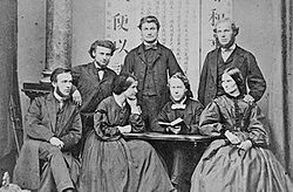
These same people would probably have very disparaging things to say about the Christian missionaries who went to China in days gone by, sincerely believing that they were saving heathen souls from damnation. But if you are forcing your worldview on your students, what makes you any different from a missionary? The 'fact' that your opinions are right and theirs were wrong?...
Okay, so we are teaching grammar and tenses and so forth. Gotcha. But suddenly, one paragraph down, our hypothetical English teacher is denigrated as a mere "technician," "transmitting McDonaldised content (mini-chunks of easily digested junk)."
Ouch!
Suddenly we're teaching grammar.... for The Man!
But, how does the author, J.J. Wilson, deal with the objection that teachers should keep their opinions out of the classroom? He deals with it by explaining that it's impossible: "Everything the teacher does in class reflects her beliefs about education, about people and about the world.... educators cannot help revealing deeply held beliefs."
The article discusses how to "subvert the syllabus" and gives examples of how to do it.
Hmmm, 'subvert,' that's an interesting choice of word. Not "introduce" or "adapt." I like teaching word families to my students, so if "subvert" came up, I'd jot the other forms on the board.... Subvert, verb, subversion, noun, subversive, adjective..... To "subvert" means: the teacher is not doing what he or she was hired to do, and is instead hijacking the classroom for their own agenda. Again, Wilson assumes that we agree this would be a good thing because..... social justice.
So how to approach this kind of student, a student who'd like to have a job, maybe own a house and have something to live on in old age? I gather that Wilson thinks it's best to not be openly contemptuous or condescending with them. Be gentle. Enlighten them -- but subversively. Do not "proselytise, but tell stories instead." Maybe with some parables, like those Christian missionaries did.
Use questions like: "why an employee in a supermarket is setting out genetically engineered fruit rather than tending her garden, why a line cook is taking orders from strangers instead of cooking for his family, why a woman is watching the children of the wealthy at a daycare centre rather than spending time with her own, why a musician is composing jingles for fizzy drinks rather than jamming with his friends."
Yes, why are people exchanging their specialized services for money to buy the things they want and need, or rather, things they probably shouldn't want, if we are to consult the tastes and opinions of Dr. Wilson?
There are indeed a number of ways to explain how this nightmare scenario came about, and many different facts could be adduced in support of the different opinions we might hold, but just note the enormous amount of question-begging going on here.
For the record, I wouldn't be afraid of discussing any of these subjects with older students, because I take care to present, as best as I can, what people say about both sides of the issue, and then ask them how they feel about it.
But it's very obvious from the article that Dr. Wilson regards his own worldview and opinions as the correct ones, because he is against "injustice." To cite just one example, his opinions and mine about the causes of injustice in Palestine and Israel might be very different. Yet, because he uses the magic words, "social justice," he believes he has a license to promote his views as the correct ones.
In my teaching philosophy, I referred disparagingly to the notion that kids today just need to learn "critical thinking," as opposed to learning, you know, facts and stuff like math and history. The EL Gazette article demonstrates why it is essential that students are taught the rudiments of formal logic, and learn how to recognize fallacious and poorly presented arguments. Should they have the misfortune of being trapped in a classroom with a professor who abuses his position in this fashion (which was certainly my experience in college), they will be better equipped to analyze what they are being told, better able to ask questions that test those assumptions and misconceptions.
I enjoyed teaching the rudiments of logic and rhetoric in my ESL debate class. Another exercise I do with students in oral English classes is to ask them, "what services should government provide?", and list down all of the things they say on the blackboard, and ask them, "should the government take care of old people who have no money?" "should the government do this, or that?" And then I ask them, "what percentage of their salary would they give to the government, to have all the things they say governments should do?" The exercise reminds young people about how society is structured, and hopefully gets them thinking about how much government they want, and at what price.
And Dr. Wilson's article would be a very useful reading to bring into a logic and rhetoric class, abounding as it does in examples of logical fallacies.
 RSS Feed
RSS Feed